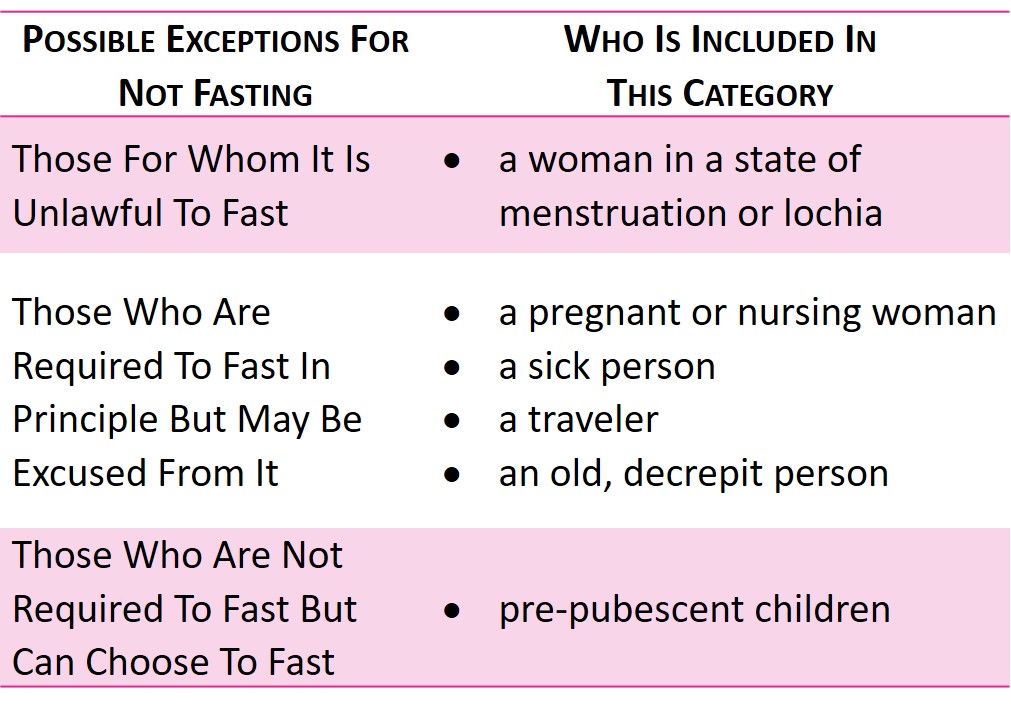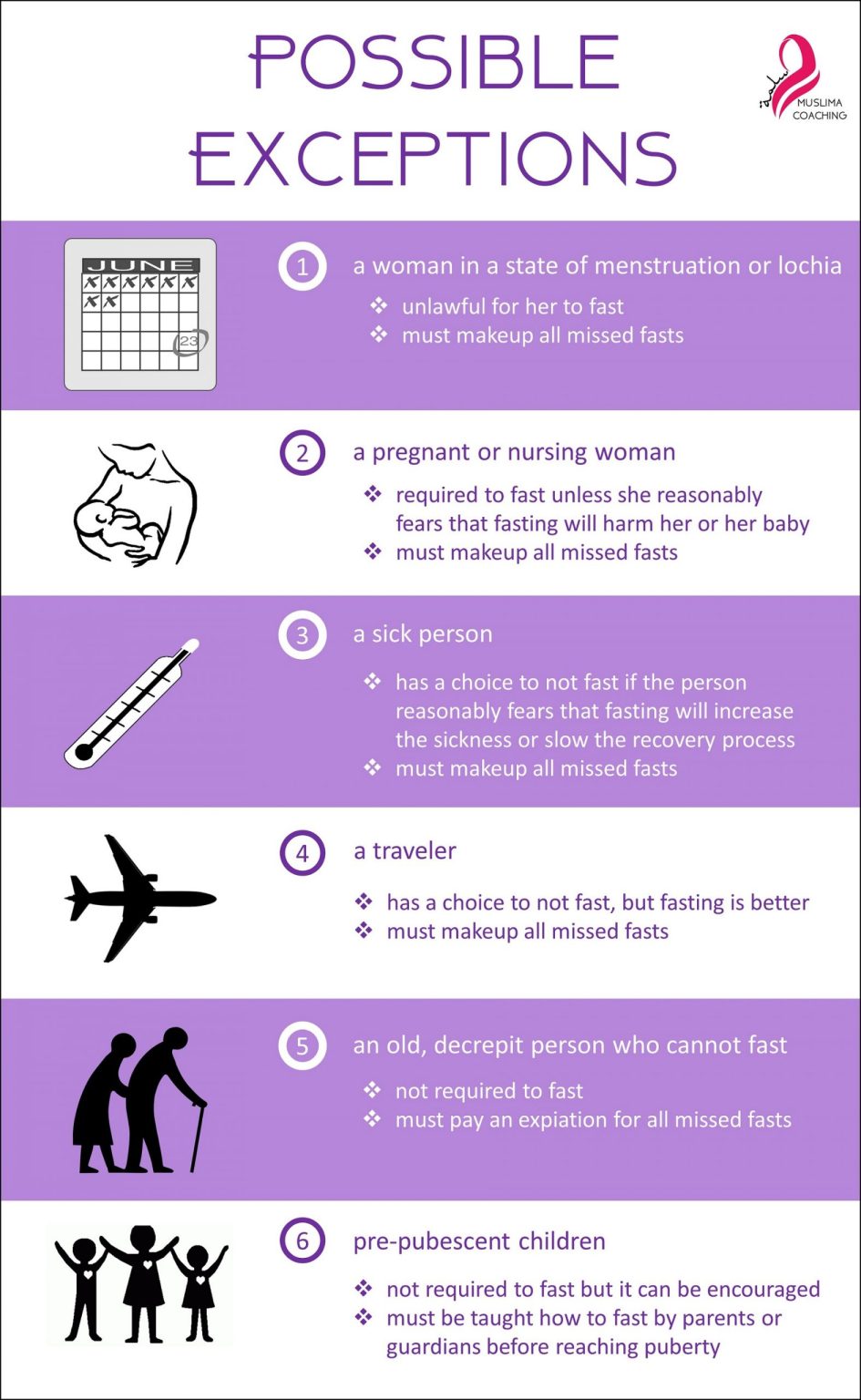Question: Who must fast Ramadan? Are there exceptions?
Answer:
Bismi Llahir Rahmanir Rahim
Assalamu alaykum wa rahmatuLlahi wa barakatuhu
Fasting the month of Ramadan is obligatory upon:
- every Muslim,
- who is mentally sane,
- and post-pubescent.
Reaching Puberty
A male child becomes pubescent when he experiences his first wet dream or ejaculation.
A female child becomes pubescent when she experiences a wet dream or her first menstruation.
If by the age of 15 lunar years (approximately 14 solar years, 5 months, and 15 days) neither male nor female has undergone these physiological experiences, then they are considered legally pubescent and are required to fast Ramadan.
Missed Fasts Without An Excuse
If a person was born Muslim and missed Ramadan fasts after reaching puberty due to remissness, laziness, or ignorance to the Sacred Law, she must makeup these missed fasts before she dies. The same applies to a convert who converts to Islam but does not fast without possessing an excuse acceptable to the Sacred Law.
It is always best to make up ones missed fasts as soon as possible. It may be easier to fast them during the winter months because the time is shorter. Figure out a schedule for completing them, and inshaAlllah Allah will make it easy. We know many people who have successfully made up years of fasting.
Missed Fasts With An Excuse
There are certain types of people who may be excused from fasting the current month of Ramadan.
Each category contains unique details, which will be mentioned briefly. Please take care to check with a scholar before making the decision to not fast, especially since most people included in these categories are still obliged to makeup all of their missed fasts after Ramadan finishes in a time that they are able.

Women In A State Of Menstruation Or Lochia
It is unlawful for a woman who is in a state of menstruation or lochia to fast. Please read the following article for details:
Menstruation Rulings Related To Ramadan
Pregnant And Nursing Women
Pregnant and nursing women are required to fast all of Ramadan. However, an exception is made for a woman who fears that the act of fasting will harm her or her baby. Please read the following article for details:
Are pregnant and nursing women required to fast Ramadan?
The Sick Person
Not every sickness will prevent one from the ability to fast. It depends on one’s symptoms and overall physical state. Slight headaches and minor discomfort are expected, especially during the first week of Ramadan. A person who is ‘not feeling well’ or ‘hungry’ cannot unconditionally break the fast.
However, certain illnesses can excuse a person from fasting if it will cause undue hardship because one reasonably fears that the act of fasting will increase the sickness or slow the recovery process.
Reasonable fear is known by: 1) manifest signs, 2) a relevant past experience, or 3) the notification of an upright, Muslim doctor/expert who is familiar with the limits of the Sacred Law. Please contact a local scholar for details.
If it is certain that by fasting one will harm oneself, then fasting is not permissible, and if one dies while fasting in this state, one is sinful. Thus, a believer should not be negligent nor excessive in her adherence to the Sacred Law. Islam is the middle way.
If any fasts are missed due to sickness, they must be made up once Ramadan is over at a time when one is physically able. There is no expiation for a person who delays making up her missed fasts, although it is superior to make them up immediately if one is able.
A Traveler
A traveler is also excused from fasting. However, it is still better for a traveler to fast, providing that this does not cause undue hardship.
If a person who is resident initiates a journey in Ramadan and leaves the city limits before the time of Fajr enters, she is ruled as a traveler and is not required to fast for that day.
However, if a person who is resident begins fasting a day in Ramadan and later travels during the fasting time, she is required to complete the fast for this day. If she continues to be in a state of travel the next day, then she has a choice to fast.
If a traveler becomes resident during the fasting time in Ramadan, she must act like a fasting person until the Maghrib time enters due to the sacredness of the month of Ramadan. It is necessary (wājib) for her to abstain from eating and drinking for the remainder of the day. She is sinful if she does not do so. However, this day of acting like a fasting person does not count as a fast.
If any fasts are missed due to travel, they must be made up once Ramadan is over at a time when one is able. There is no expiation for a person who delays making up her missed fasts, although it is superior to make them up immediately if one is able.
Old, Decrepit People
Elderly people who reach an age in which they cannot physically bear to fast and have no chance of being able to fast in the future are excused from fasting.
They are required to pay an expiation (fidya) of feeding a needy, poor person for each missed day of Ramadan. The fidya for a single fast is approximately 1.75 kilograms of wheat or the equivalent monetary value.
If a person who takes this dispensation unexpectedly gains the ability to fast in the future, they must make up the fasts that were missed and their expiation counts as voluntary charity.
A sick person who has no chance of recovery may fall under this category. Please contact a scholar for more details.
Pre-Pubescent Children
Children who have not physically reached puberty (or 15 lunar years) are not required to fast. If a child decides to fast, it counts as a voluntary fast (nafl) and the parents are rewarded for it.
It should be noted that it is the parents’ duty to teach their children how to fast and act like religious Muslims. At the age of seven, it is recommended for children to start fasting and at the age of ten, they are treated like adults with regards to being personally responsible for their prayers, fasts, and outward dress.
However, some children are inclined to fast from a very young age, and a parent in this situation should be encouraging. For example, parents can permit their small children to fast short time slots during the day, like a couple of hours or half of the day. Parents can also reward their children for fasting an entire day successfully. All of this should be done in order to make fasting easier upon the child and appealing to them once he/she reaches puberty. Several women have told us that they chose to remain religious because they had happy memories of Islam in their childhoods. For more ideas, please read this article.

Check out our courses for more details about the general rulings of worship.
Jazak Allah khayran
Naielah Ackbarali
References:
- Imam Shurunbulali, Maraqi al-Falah
- Imam Tahtawi, Hashiyya al-Tahtawi
